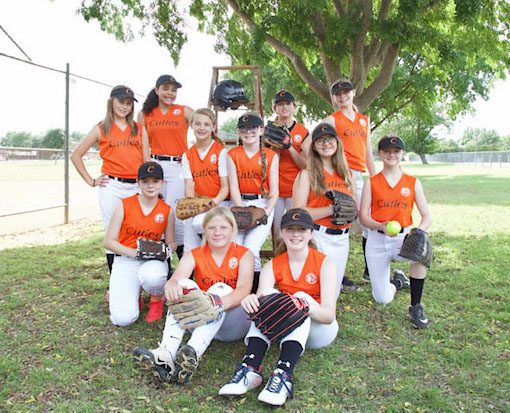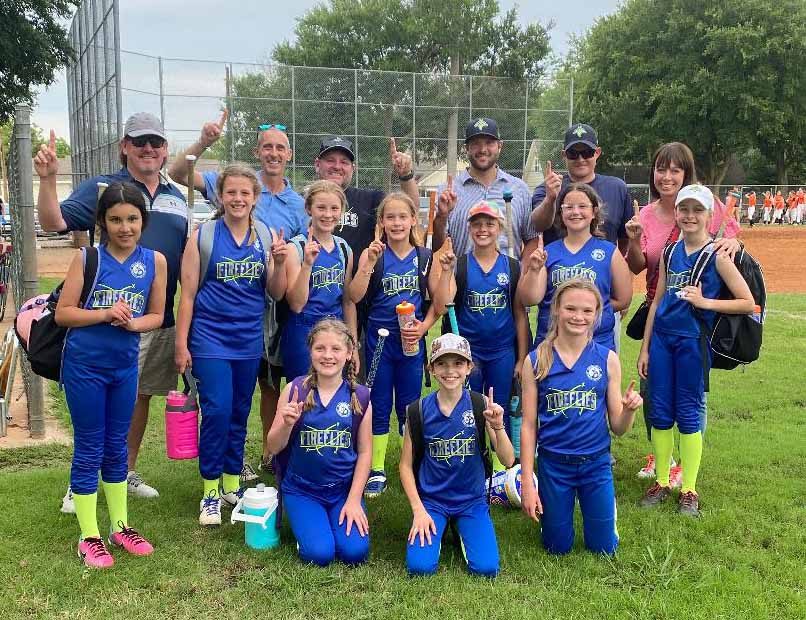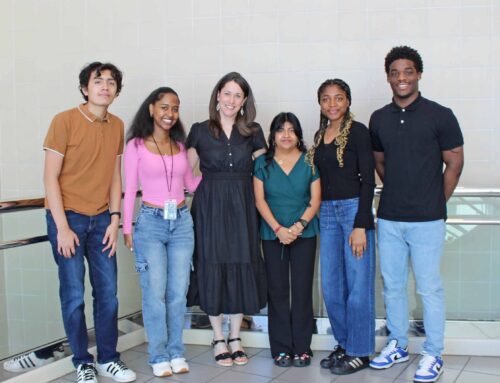On a Saturday afternoon in May, Dr. Lauren Ortega sat next to a baseball diamond watching her daughter, Layla, play softball. The fifth-grade Fireflies from White Rock Elementary were facing the sixth grade Cuties from Moss Haven, rivals in the Spring Valley Athletic Association (SVAA) league.
When Ortega heard team dad and scorekeeper Mark Gray begin snoring during the game, she realized something was off. After his chair collapsed, she switched from her role as mommy and team cheerleader to that of pediatric hospitalist in the blink of an eye.
“Initially I thought he might be having a seizure, so I shouted, ‘Call 911,’” remembers Ortega. “Pretty soon I assessed that he did not have a pulse and wasn’t breathing.”
Ortega began CPR, but Gray is bigger than she is, so Chris Fulmer, near the Firefly dugout, and Will Dusek, coaching the Cuties at first base, ran over to alternate compressions. Ortega’s older daughter, Ava, retrieved her first aid kit from the car and pinched Gray’s nose closed. Ortega breathed into his mouth, administered epinephrine and directed the life-saving efforts. Other parents gathered and calmed the players, while a few stood watch for the ambulance.
“It felt like a million years, but I guess it was 8 to 10 minutes” of CPR, says Ortega. Then paramedics arrived to shock his heart with their automated external defibrillator (AED) and take him to the hospital.
Ortega has helped in emergencies outside of work before – twice on airplanes and once in a restaurant – but this is the first time she’s ever given aid to someone who wasn’t breathing and had no pulse. She has advice for people who lack a medical degree but hope to provide help if they’re ever needed.
“Number one, get CPR-trained. It only takes a couple of hours. Number two, call 911 and then start high quality CPR and don’t stop. Don’t even pause, just do it until help arrives. Without it, the survival rate for out-of-hospital cardiac arrests like this is about 5-10%.”
Gray, now recovered and fitted for a pacemaker, was fortunate to have Dusek in the opposing dugout. Dusek became CPR-certified in a high school health class and took a refresher before the birth of his daughter. Even better, he knows CPR is effective. At 9, he watched his father use mouth-to-mouth resuscitation to revive his 7-year-old brother after an accident at home.
“That memory surfaced when I was doing compressions on Mark, and I just told myself, ‘You’ve seen this work. You know this works. Don’t stop.’”
Dusek has high praise for everyone at the scene who played their part in saving Gray’s life.
“The umpire should be given a lot of credit, because he immediately saw what was happening, called ‘time’ and shouted for someone to call 911. He sensed the urgency and spurred people to action. Dr. Ortega gave me positive reinforcement about the compressions I was giving, and that was all I needed. I was going to fight for this guy as long as it took. Chris and I kept swapping out, and – although it was exhausting – I think we both felt we could have gone on all day if we had to.”
Adrenaline, Dusek, says, has a crazy way of slowing down time and hyper-focusing the senses. He recalls looking down and finding his knees bloodied from bracing himself on the concrete, applying all the pressure he could muster.
“Chris and I were strong enough, fit enough and determined enough to do everything we could to save his life.”
After the incident, Dusek remained emotional about the afternoon’s events. He went to Oak Highlands Brewery, owned by Cuties dad Brad Mall, and relived the day with another team dad.
“I spoke to my pastor a few days later and a paramedic a few days after that. Honestly, the fact that he survived has probably affected me more than if he didn’t.”
Fulmer, too, thought about the incident long after he watched the flashing lights speed away.
“It was an emotional roller coaster. The paramedics were great, but when they left, he wasn’t sitting up or talking. He was still very critical. We felt good about helping, but we didn’t know if he was okay. We wanted to flip a switch and make him better.”
Later that afternoon, Gray’s wife, Maurie, called everyone involved to let them know he was sitting up and communicating. It was a huge sense of relief, Fulmer says.
For a while before the softball game, Gray knew his heart felt hinky. He’d visited his doctor and gone to the famed Cooper Clinic, but scans showed the occasion “blip” wasn’t concerning. He was prescribed blood pressure meds and sent on his way. A week prior to the game, his Apple watch warned of a serious drop in his heart rate. He Googled “heart rate of 40” and learned the issue is common, and he felt reassured when his rate returned to normal. That weekend he felt sleepy, but the Grays – like most LH families – stay busy running from one event to the next.
“Thank God we didn’t get in a wreck on the Tollway on the way to the game,” he says now, thinking back. “Landry wouldn’t have been in good shape, and I would have had zero chance of survival.”
Unlike a heart attack, which may allow some blood to flow through the system, Gray’s cardiac arrest was like an electrical short.
“It’s like turning off a light switch, and instantaneously my brain was not getting oxygen. If I didn’t have someone there doing CPR, that’s when your brain starts to lose activity.”
To his amazement – and that of the paramedics – Gray woke up in the ambulance.
“You’ve been dead,” the paramedics told him after a while under the Lucas chest compression machine. “Now you’ll be fine. You’re going to be saved.”
Gray has a message of gratitude for everyone who helped to save his life that day.
“It was the grace of God that put all the people in all the right places – some I’ve never met before and some live down the street. I’m so thankful.”
At a recent board meeting, SVAA officials honored Ortega, Dusek and Fulmer with their “Good Samaritan Award.” They also created the “SVAA Big Heart Award” to recognize future SVAA players, coaches and families who demonstrate similar selflessness and courage.
“This award is being given to recognize the recipient’s quick thinking and bravery while coming to the aide of another,” reads the Good Samaritan certificate. “This recipient is a living example of the values SVAA hopes to pass along to the youth that we serve.”
“It’s very sweet – a nice gesture,” says Fulmer. “I love the attention SVAA is bringing to CPR training. Parents have come up and asked how I knew what to do. Some said they’d sign up to learn.”
You can sign up with the American Red Cross here.
Afterward Brittany Code, Firefly mom and WRE school counselor, helped girls on the team write letters to the SVAA expressing how scary it was to watch the emergency play out. Some said umpires should be trained in CPR or carry portable AEDs in their bags. Others suggested Richardson ISD schools install AEDs on each campus. RISD rewarded the bright thinking girls with their “Say Something Award.”
About 3 weeks after that initial game, the Fireflies and the Cuties met again on the same field for the league championship. It was an emotional reunion.
“We had this bond,” says Fulmer. “It was hugs and big handshakes between the teams, with parents mixing and mingling instead of sitting on opposite sides. We really came together as a community, because both sides had people who jumped in to help out. The kids wanted to play, so we competed, but it was good to see Mark. It was the first time he’d been back at a game. It could have been a different outcome. What a storybook ending.”







